Acupoint massage (acupressure), as an extremely easy-to-learn self-care method, allows us to play a more active role in our own health management. By stimulating specific acupoints on the body, we can activate its inherent self-healing potential, clear obstacles to energy flow, and promote the smooth circulation of Qi and Blood. This is like carrying a personalised health toolkit with you, convenient to access and use for self-conditioning anytime, anywhere.This method is not only simple but can also deepen our awareness of our own physical condition, thereby achieving a deeper level of health maintenance and truly embodying the proactive spirit of a 'Happy Healthy Life'.Among the many acupoints, our focus today – the Quchi acupoint (LI11) – with its wide-ranging efficacy and powerful conditioning functions, is undoubtedly a star member of your 'Happy Healthy Life' toolkit.
Getting to Know Quchi (LI11): A Hidden Gem at the Elbow
The Quchi acupoint (LI11), its name rich in poetic meaning, signifies a 'pool at the bend' (referring to the elbow). It is a key hub on the Hand Yangming Large Intestine Meridian.In Traditional Chinese Medicine (TCM) theory, Quchi is classified as a 'He-Sea point.' This means the Qi and Blood of the meridian converge deeply here, much like flowing water, giving it a profound influence. Furthermore, Quchi corresponds to 'Earth' in the Five Elements theory, which endows it with characteristics of stabilising, calming, and nourishing. These characteristics make it particularly effective in regulating chronic conditions and balancing the body's energy.The properties of being a 'He-Sea point' and its 'Earth' element nature together reveal why Quchi can produce such wide-ranging effects; it not only regulates the local area but can also influence related Zang-Fu organs (such as the Large Intestine - the TCM organ system) and the body's overall Qi dynamics.
So, where is this amazing acupoint located? The method for finding the Quchi acupoint (LI11) is quite simple, which also makes it an ideal choice for daily self-care.Firstly, please bend your elbow to about a 90-degree angle. An elbow crease will now naturally appear on the outer side of your elbow. The Quchi acupoint is located at the outer end of this elbow crease, in the depression just in front of the lateral epicondyle of the humerus (the bony prominence on the outer elbow).If you gently press this spot with your finger, you will usually feel a characteristic aching and distending sensation – what Traditional Chinese Medicine (TCM) calls 'Deqi' (the arrival of Qi). This indicates you have accurately found the acupoint.The ease of locating the Quchi acupoint greatly lowers the barrier to self-care, allowing everyone to use this point for daily conditioning without needing professional knowledge or special tools.
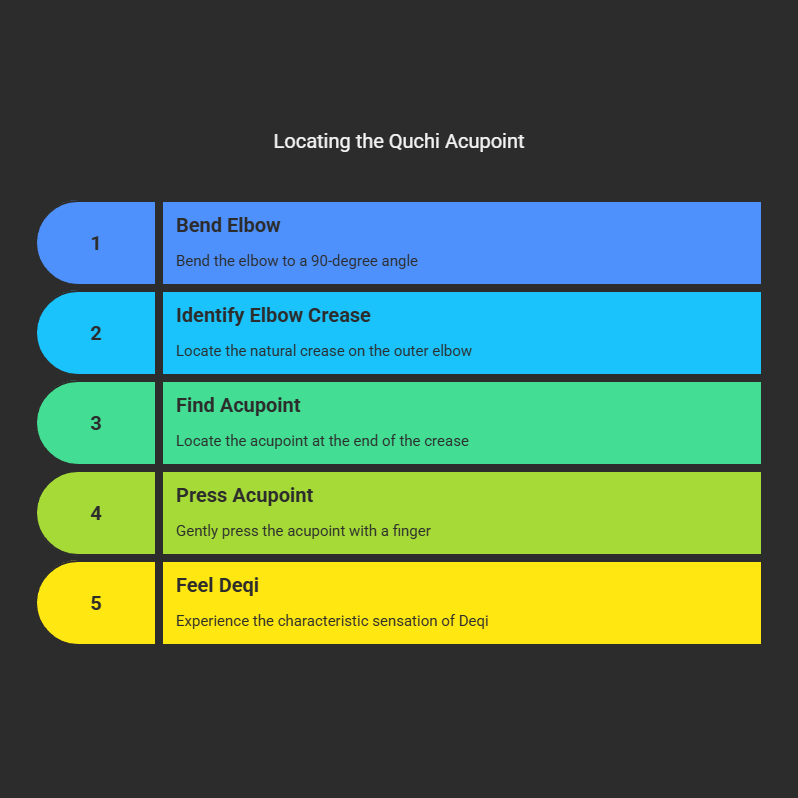
The Multifaceted Benefits of Quchi (LI11): How It Contributes to Your 'Happy Healthy Life'
The Quchi acupoint (LI11) offers numerous benefits that can enhance our daily well-being in multiple ways and effectively help manage the common discomforts of modern life.
A. Clearing Heat and Releasing the Exterior; Soothing Inflammation One of the most acclaimed functions of the Quchi acupoint (LI11) is clearing pathogenic heat from the body. This makes it significantly effective for externally contracted febrile diseases such as fever and sore throat, as well as for red, swollen, and inflamed skin problems like acne (pimples), eczema, or urticaria (hives).As a Massage Therapist, I often recommend pressing the Quchi acupoint to clients experiencing these kinds of 'fire-heat' symptoms (a TCM concept). It can help cool and calm the body from the inside out, thereby bringing a sense of relief and balance.Its heat-clearing ability is not limited to the surface. Because it is located on the Hand Yangming Large Intestine Meridian, which is abundant in Qi and Blood, the Quchi acupoint can profoundly influence systemic heat syndromes and their manifestations on the skin.
B. Unblocking Meridians and Relieving Pain The pathway of the Hand Yangming Large Intestine Meridian ascends along the outer side of the arm to the shoulder; therefore, massaging the Quchi acupoint (LI11) is very effective for relieving pain, stiffness, and numbness in the elbow, arm, and shoulder. These symptoms are common among people who work at a desk for long periods, frequently use a computer mouse (colloquially known as 'mouse hand'), or perform repetitive arm movements (such as those leading to 'tennis elbow').The Quchi acupoint can 'clear the meridians and unblock the collaterals' (Shu Jing Tong Luo), improve local Qi and Blood circulation, and release muscle tension, thereby reducing discomfort. For common upper limb dysfunctions in people today, Quchi is undoubtedly an important regulatory acupoint that can effectively address Qi stagnation and Blood stasis caused by repetitive strain.
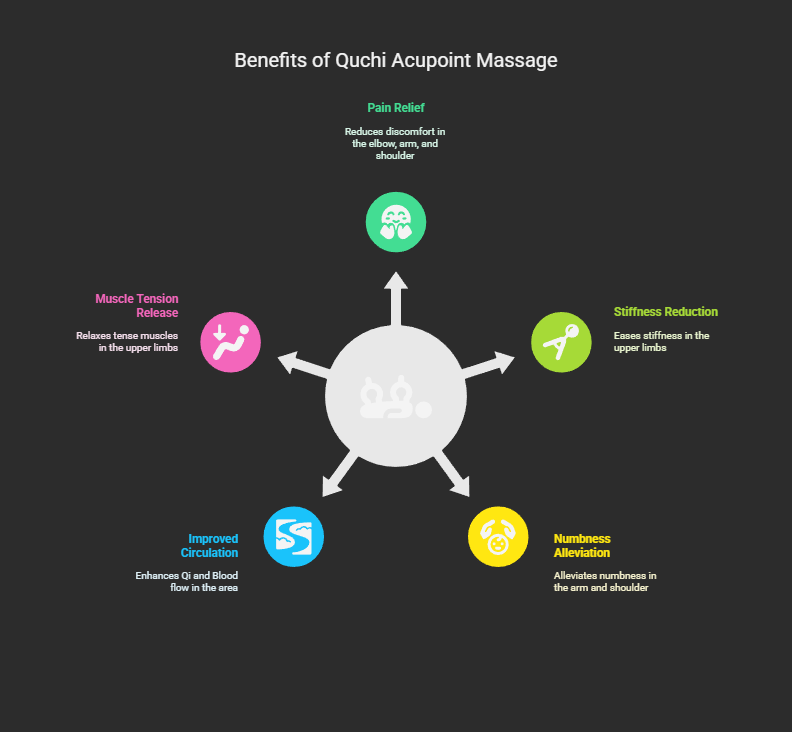
C. Harmonising the Digestive System and Improving Digestion As the He-Sea point of the Large Intestine Meridian, the Quchi acupoint (LI11) has a significant regulatory effect on the digestive system. It can help adjust bowel function, thus being beneficial for both diarrhoea and constipation – two diametrically opposed symptoms – reflecting the wisdom of Traditional Chinese Medicine's (TCM) bidirectional regulation. Furthermore, it can also relieve abdominal pain and discomfort by clearing 'Damp-Heat' from the intestines (a common cause of many digestive disorders according to TCM).Although Quchi is located on the arm, it can treat digestive system problems; this is a typical example of the 'distal effect of acupoints' in meridian theory. Its nature as a 'He-Sea point' and its 'Earth' element property further strengthen its function of regulating the Spleen-Stomach digestive system (considered the main digestive organs in TCM).
D. Regulating Blood Pressure and Supporting Cardiovascular Health It is worth noting that Traditional Chinese Medicine (TCM) believes the Quchi acupoint (LI11) helps regulate blood pressure, particularly in cases of high blood pressure (hypertension). Although acupoint massage (acupressure) is a complementary therapy and cannot replace formal medical diagnosis and treatment, regularly stimulating the Quchi acupoint can help promote the overall health of the cardiovascular system.Some methods even suggest moderate patting (or 'tapping') of this area with the aim of assisting in lowering blood pressure. This also highlights the diversity and flexibility with which stimulation techniques can be adjusted for specific goals, adding more interest and effectiveness to self-care.
E. Balancing Qi and Blood; Boosting Vital Energy (Yuan Qi) By clearing heat, unblocking the collaterals (channels), and regulating Zang-Fu organ functions, the Quchi acupoint (LI11) plays a crucial role in balancing Qi and Blood – the fundamental life substances in Traditional Chinese Medicine (TCM) theory. As the saying goes, 'When Qi and Blood are harmonious, illness is less likely to take hold.'This helps to enhance the body's immunity and resist the invasion of external pathogenic factors. Simultaneously, because it can clear pathogenic heat that disturbs the Mind (Shen), it is also helpful for alleviating emotional problems such as anxiety and irritability. Ultimately, it comprehensively enhances our vitality and sense of well-being.It can be said that the Quchi acupoint is a true 'adaptogenic' acupoint, intelligently helping the body find its inner point of balance and allowing mind and body to return to a state of harmony.
A Self-Application Guide: Mastering Acupressure Techniques for Quchi (LI11)
To effectively massage the Quchi acupoint (LI11), you can use the pad of your thumb or index finger to apply stable and firm pressure. You can either press and hold steadily, or use small circular kneading motions.Some people might find gentle tapping or patting techniques also very effective, especially when aiming for broader effects, such as assisting in blood pressure regulation. It is recommended that you try different techniques to find the method that best suits your personal sensation and yields the best results.Regardless of the technique used, the key is moderate pressure, ideally inducing a mild sensation of aching, numbness, distension, or heaviness (often referred to as 'Deqi' in TCM); severe pain or discomfort should be avoided.
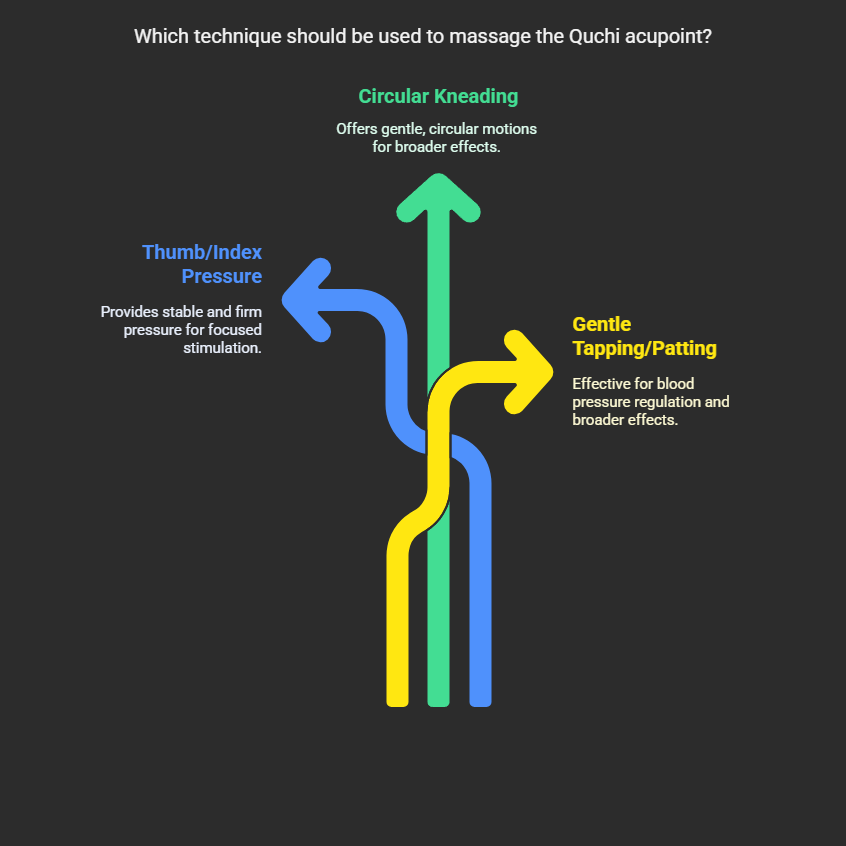
For effective acupoint massage (acupressure), the key lies in achieving a sensation known as 'Deqi' (the arrival of Qi). This usually manifests as a local mild soreness, a tingling or prickling feeling, a sensation of warmth, or a distending sensation that radiates distally (further from the body's centre). The pressure should be sufficient to induce this kind of sensation, but it should not be sharp or unbearable.It is important to listen to your body's response; it will honestly tell you if the pressure is appropriate. This 'Deqi' sensation, often described as an aching or full feeling, is a sign that the meridian Qi and Blood have been effectively activated, and it is also the foundation for acupoint massage to produce its expected therapeutic effects. If there is only superficial pressure without this deeper sensation, the therapeutic effect may be greatly reduced.
For routine health maintenance, it is recommended to massage the Quchi acupoint (LI11) once or twice daily, spending about 1 to 3 minutes on the point on each arm per session. If you are addressing specific health issues, you can increase the frequency and duration as appropriate. Consistent, regular massage is more important than long but infrequent sessions.Some also suggest performing 30 to 60 presses or rubs on each point per session, 2 to 3 times daily. You can choose the approach that best fits your own lifestyle and stick with it; this way, you can better experience the benefits of the Quchi acupoint and make health a habit.
Before starting massage, ensuring your hands are warm is an important preparatory step. Warm hands not only make the touch more comfortable but also help Qi and Blood to flow more smoothly, enhancing the effects of the massage.At the same time, find a comfortable, relaxed posture, whether sitting or lying down. Take a few deep, long breaths, and allow your mind and body to calm. This can enhance the body's receptivity to therapeutic stimulation.These preparatory steps are not just for comfort but are also rooted in Traditional Chinese Medicine (TCM) concepts. They aim to optimise the flow of Qi and the body's receptive state, thereby enhancing the therapeutic effects of acupoint massage. Avoiding massage when overly hungry, too full, or emotionally agitated also helps to maintain the stability of the body's Qi mechanism (or 'energy dynamics').
Important Considerations: Quchi (LI11) – Suitable Timing and Precautions
Although acupoint massage (acupressure) is generally considered a very safe self-care method, it should still be approached with caution. Massage should be avoided on areas where the skin is broken, has open wounds, bruising, or shows signs of redness, swelling, or inflammation, or where varicose veins are present.If you suffer from more serious health conditions, such as heart disease or cancer, or are currently undergoing specialist medical treatment, it is advisable to first consult your GP or another relevant healthcare professional before starting any new self-care practices (including acupoint massage), to ensure they are appropriate for your specific circumstances.
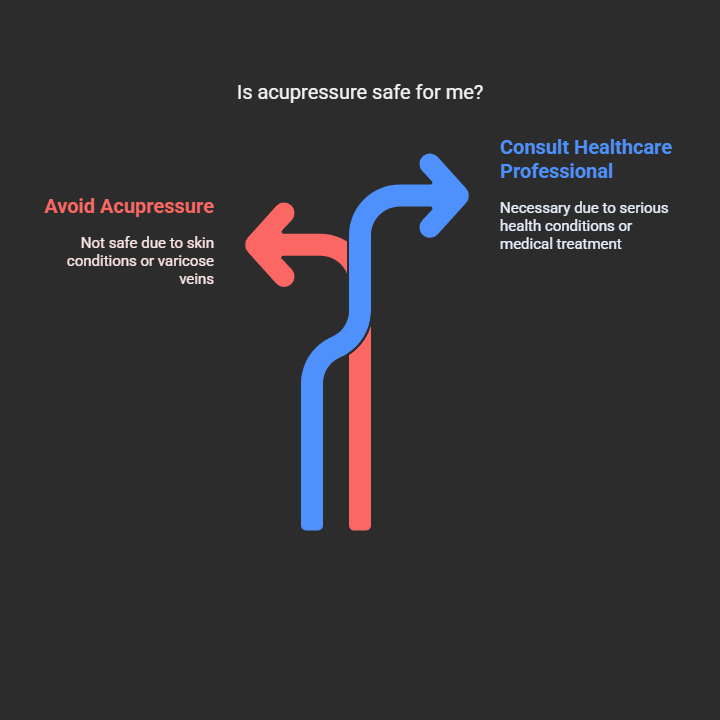
Regarding the Quchi acupoint (LI11) itself, Traditional Chinese Medicine (TCM) theory considers it to have a relatively strong action with some effect in promoting Qi flow and invigorating blood circulation. Therefore, pressing this acupoint should be avoided during pregnancy to prevent potential stimulation of uterine contractions and any unnecessary impact on the pregnancy.Furthermore, if the skin at the acupoint site is inflamed, infected, or has an unhealed wound, you should temporarily stop pressing and only resume once the condition has improved. If you experience any abnormal severe pain, dizziness, or other discomfort while pressing, stop immediately, observe your body's reaction, and seek professional advice if necessary.
Using acupoints for self-care is an excellent complementary health tool, but it cannot, and should not, replace professional medical diagnosis and care.If your symptoms are relatively severe, if you see no significant improvement after a period of self-care, or if you have any doubts about your own condition, please be sure to promptly consult qualified healthcare professionals. These may include a GP (Western medical doctor), a Traditional Chinese Medicine (TCM) practitioner, a licensed acupuncturist, or an experienced massage therapist. They can provide you with an accurate diagnosis and guide you towards appropriate treatment plans based on your specific circumstances.Understanding the scope and limitations of self-care is a very important part of pursuing a 'Happy Healthy Life'.
Conclusion: Let Quchi (LI11) Be Your Ally for a Wonderful 'Happy Healthy Life'
In summary, the Quchi acupoint (LI11) is undoubtedly a 'star' acupoint with diverse functions that is easy to master, capable of effectively enhancing our daily health and well-being. From clearing heat and detoxifying, and soothing skin discomfort, to relieving shoulder and arm pain and assisting digestive function, and further to promoting overall Qi and Blood balance and boosting Yuan Qi (Original/Vital Energy), its benefits are wide-ranging and tangible. It directly makes a positive contribution to our pursuit of a more vibrant and comfortable 'Happy Healthy Life'.Its characteristics of easy location and simple massage techniques make it a practical tool that anyone can easily incorporate into their regular self-care, truly embodying the spirit of proactive health management and self-reliance.
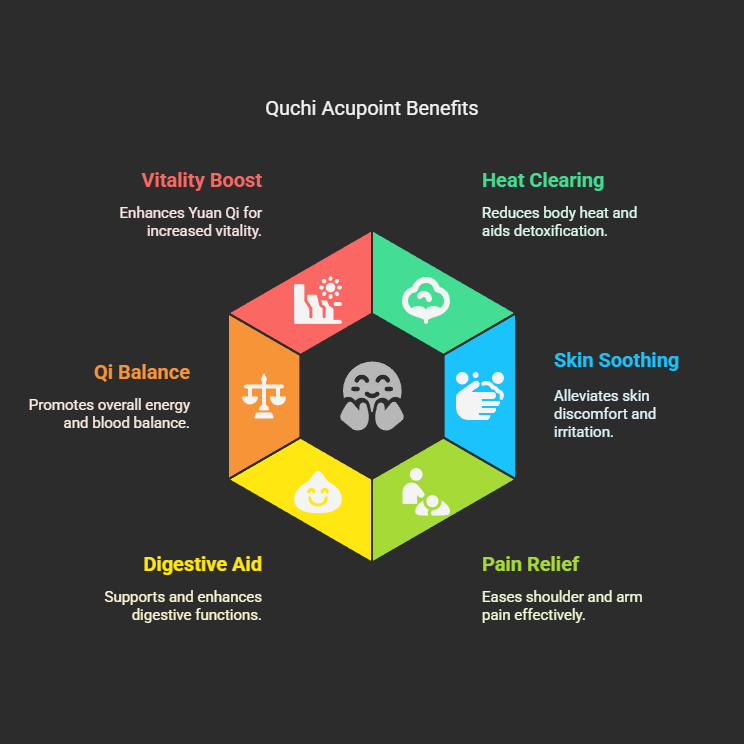
I sincerely encourage everyone to start trying to integrate massage of the Quchi acupoint (LI11) into their daily or weekly routine. Whether it's during breaks while watching TV, taking short rests from work or study, or as part of a morning routine to awaken the body or an evening routine to relax the mind and body, consistency is the key to maximising its effects.Please remember, small and regular self-care efforts can often, without you necessarily noticing, bring significant improvements in how your body feels. Such health maintenance habits, built up over time, are precisely the solid foundation for a lasting 'Happy Healthy Life' and for enjoying a good quality of life.
As a Massage Therapist, my greatest wish is to empower every individual with practical health knowledge and tools, helping everyone to actively participate in their own 'Happy Healthy Life' journey. The Quchi acupoint is merely a microcosm of the many such tools found in the treasure trove of Traditional Chinese Medicine (TCM) meridians and acupoints.By learning to listen to our body's signals, engaging in conscious self-care, and making wise health choices, we can together cultivate a wonderful life full of health, happiness, and inner vitality.Please believe that personal well-being and health are indeed in our own hands – and this is also true in a literal sense (referring to the power of our hands in self-care).



